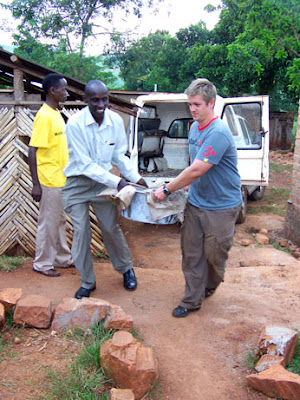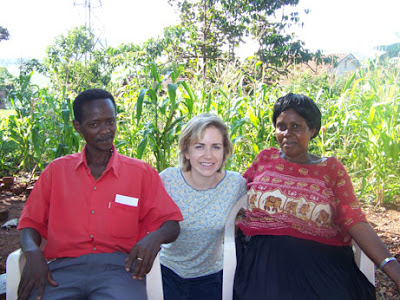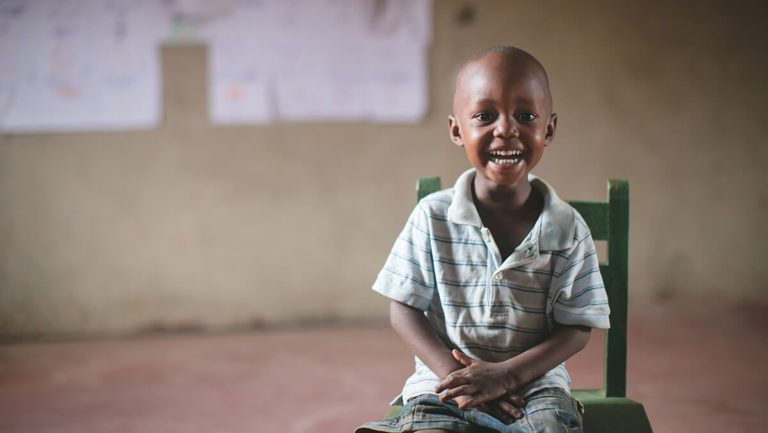The following is a report from a young couple named Paul & Monika who lead a team to St. Ameria’s orphanage this last November. In addition to a Thanksgiving feast, Streams of Mercy sent a donation with them to repair roofs on the orphanage facilities:
 “We’ve brought you a Thanksgiving feast!” Paul said. “Rice, matooke, chapatti, and beef!”
“We’ve brought you a Thanksgiving feast!” Paul said. “Rice, matooke, chapatti, and beef!”
The excited cheers of the children filled the small, brick schoolroom. We were just outside of Jinja, Uganda, at an orphanage called St. Ameria’s.
St. Ameria began in 1991 when Edith, an orphan who had grown up in a convent, decided to do something to help other children as she had been helped. Now, the orphanage is home to 75 kids and also a primary school for 340 others in the village. Most of these children have lost their families to AIDS or war in the north.
Back home in the United States, our friends and families had just celebrated Thanksgiving. Now, thanks to a donation from Streams of Mercy in the States, we celebrated Thanksgiving by bringing a large feast to St. Ameria’s.
While the feast was being set out, I passed paper and colored pencils to the children while they sat patiently at their tables.
“Draw a picture of what you’re thankful for,” I said. The kids cheered again.
“And after we eat, we’ll play games.” Again, the room filled with their loud shouts. Smiles spread across their faces and they busily began to draw.
I remembered the first time I’d been in that classroom a few days before. I had sat where the children were now busily drawing. And twenty of the older children stood in the front of the class, singing. The soloist – a ten year old girl – sang out with a beautiful, clear voice.
“AIDS,” she sang, “you’ve stolen our families and our futures.” Tears filled her eyes and spilled onto her cheeks. She sang in English and Luganda, warning listeners about the danger of AIDS and the tragedy it brings.
While she sang, the rest of the choir hummed in harmony. As the song came to an end, they all turned around and faced the wall. They cried for the lives of their mothers and fathers.
Tears also fell down my face as I thought about the individual lives that had been affected by AIDS. At that moment, HIV/AIDS was no longer a statistic I read about or heard on the news. I saw the faces of children who had been impoverished or orphaned by the disease.
Now, as I walked around the classroom, admiring the drawings the children made, I was glad to take a small part in bringing a happy  day to these kids.
day to these kids.
Soon after everyone had eaten—and their bellies were noticeably full—we took the kids outside to play in the soccer field. I sat with Edith under a tree and interviewed the children one by one. I discovered kids who wanted to be nurses, doctors, and engineers when they grew up. Kids who were passionate about singing and playing netball. Kids who liked reading but not math. Kids who tickled their friends to help them smile for the camera. We wrote their short—though often painful—histories until the sun set and it was too dark to see my pad of paper.
“Let’s go inside now,” Edith said, shepherding the children into a long, three room building.
Someone found kerosene lamps and showed us where to sit. Seven kids squished onto an old sofa next to me. Another handful piled on Paul when he sat in a chair.
We sang and told stories for an hour. Just before we left, Edith asked which of the children wanted their evening porridge.
For the first time, no one wanted any—they were still too full from lunch!
“This will be a day that they children always remember,” Edith said, as she walked us to our taxi-bus. “Thank you.”
